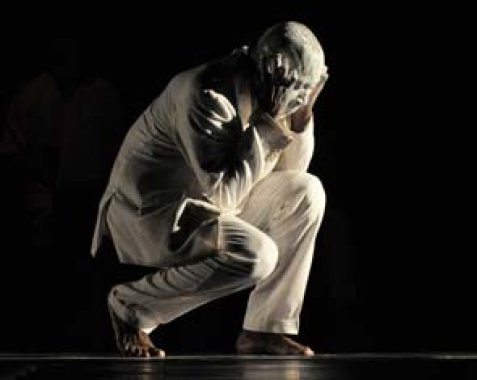From tradition to creation. This could describe the spiritual and artistic search of the performer, dancer and choreographer Koffi Kôkô from Benin, a pioneer in introducing modern African dance to Europe, which finds its expression in an original synthesis of black roots and western culture, well-exemplified in Passage, the 1984 solo which he took on tour around the world.
His artistic training was a true initiation into dance, which included the animistic rituals of his native region and the Nago-Yoruba culture, revitalized in the shamanic power that emanates from a most original language of the body, a vehicle for mysteries that are inaccessible in words. The heritage of an “oracular” dance, which becomes a liaison with divine wisdom, and found new energy when Koffi Kôkô moved from Benin to Paris and later to New York in the mid-Seventies, coming into contact with the lessons of artists such as Peter Goss, Yoshi Oida and the schools of Katherine Dunham and Alvin Ailey.
The particular symbiosis between Koffi Kôkô’s African matrix and his western experience was also favoured by his collaborations with some of the most important figures in contemporary dance and theatre, including Pierre Doussaint, Bruno Boêglin, Shiro Daimon and Yoshi Oida, Gabriel Gbadamosi and the flamenco dancers Mari Carmen Garcia and Peter Badejo. With Ismael Ivo, Koffi Kôkô performed The Maids, from the homonymous text by Jean Genet, directed by Yoshi Oida, a production that won the Time Out award in 2003 as best production of the year.
Koffi Kôkô comes to the Biennale di Venezia for the first time with his latest solo, La Beauté du Diable, for its Italian premiere: it addresses the paradox of life, the human and universal duality of good and evil. Coming from a culture in which these two concepts are considered an indivisible expression, Koffi Kôkô questions the Judaic-Christian perception which on the contrary, separates them.
“Everyone who is bewitched by Koffi Kôkô will immediately forget that man created the devil to explain the evil intrinsic to his own nature. The solo is spiritual, and very sophisticated… Koffi Kôkô stands, dances, floats above every thing, including himself. He shows us that Africa also has something in common with the Butoh, when he instinctively presents himself in deep, meditative concentration, with his feet planted firmly on the ground; yet at the same time he appears spiritual, bursting with energy from the inside but with an almost stoic calmness on the outside. If only he so wished, he could easily come into contact with the realm of the dead… At this point the vocabulary of tradition belongs to him alone, and he brings it back to life, simply and unexpectedly. There is no doubt that Kôkô is one of the top figures in dance. And as such he allows himself complete freedom and plays all the “keys” of his body with great ironic power. La Beauté du Diable is free jazz, danced in a dialogue with the musicians with whom he shares the stage” (Thomas Hahn, “Tanz”).

